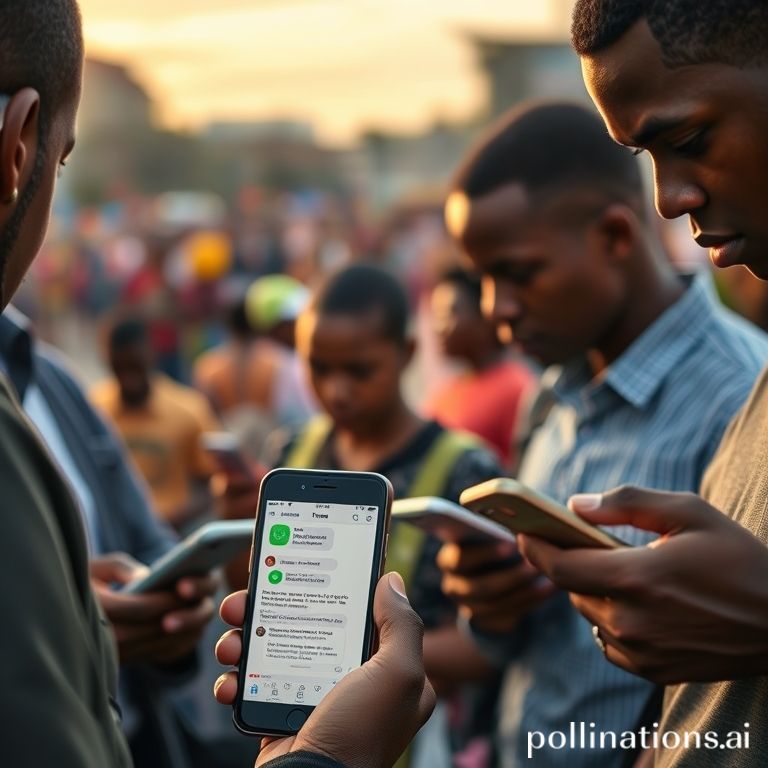
In a striking development amidst escalating socio-political unrest in Madagascar, the offline messaging application, Bitchat, has experienced an unprecedented surge in downloads and user interest. The island nation's capital has been gripped by violent protests, fueled by persistent water and power shortages, leading to a critical need for alternative and resilient communication channels. This phenomenon underscores the vital role that decentralized communication technologies can play in environments characterized by infrastructural instability and potential information control.
Madagascar’s Unrest and the Quest for Connectivity
Madagascar has recently faced significant internal turmoil, with widespread demonstrations erupting in its capital due to chronic failures in essential public services. Reports indicate that prolonged blackouts and water scarcity ignited public frustration, leading to large-scale protests that subsequently turned violent. In response to looting and clashes, authorities were compelled to impose a dusk-to-dawn curfew, further restricting public movement and communication. The escalating crisis resulted in tragic consequences, with at least five fatalities reported, and led to the dismissal of the Energy minister, highlighting the severity of the governmental pressure.
In such a volatile environment, conventional communication infrastructure often becomes unreliable or susceptible to disruption. Access to stable internet and mobile networks can be compromised, making it challenging for citizens to coordinate, share information, or even ensure their safety. This pressing need for dependable communication tools paved the way for the remarkable rise of applications designed for resilience.
The Digital Divide: A Backdrop for Bitchat’s Ascendance
The rapid adoption of Bitchat is further contextualized by Madagascar's significant digital divide. DataReportal figures from early 2025 reveal that a mere 6.6 million of Madagascar's nearly 32 million inhabitants are online. While mobile subscriptions are considerably higher, exceeding 18 million, many residents primarily utilize these for voice calls and SMS services, lacking comprehensive internet access. This stark reality means that a large segment of the population is often disconnected from the broader digital landscape, limiting their access to information and economic opportunities. In times of crisis, this pre-existing digital disparity exacerbates communication challenges, making offline solutions particularly appealing.
The inherent limitations of traditional digital infrastructure in Madagascar created a fertile ground for technologies that bypass these dependencies. For individuals in remote areas or those facing network blackouts during civil unrest, an application that operates independently of cellular towers or Wi-Fi hotspots becomes an indispensable lifeline.
Bitchat: A Decentralized Solution for Crisis Communication
Bitchat distinguishes itself as a Bluetooth mesh messaging tool, offering a robust communication platform that functions without reliance on an internet connection or traditional phone numbers. This core capability is precisely what propelled its popularity during the recent upheavals in Madagascar. The application leverages a mesh network, allowing devices to connect directly to each other via Bluetooth, relaying messages across a chain of users even when no central server or internet gateway is available. This decentralized architecture ensures that communication remains possible even in the most challenging circumstances.
Beyond its offline capabilities, Bitchat integrates advanced features that enhance privacy and security:
- Blockchain Integration: The application is intrinsically tied to the blockchain, utilizing the Bitcoin network to finalize transactions. This provides a decentralized and immutable ledger for secure operations.
- Secure Bitcoin Transactions: Users can securely send Bitcoin over Bluetooth, adding a layer of financial utility and resilience, especially in scenarios where traditional banking services might be disrupted.
- End-to-End Encryption (E2E): All communications are protected with end-to-end encryption, ensuring that only the sender and intended recipient can read messages, safeguarding privacy against surveillance.
- Ephemeral Messages: Bitchat supports ephemeral messaging, where messages automatically disappear after a set period, further enhancing user privacy and reducing digital footprint.
- Cryptocurrency Wallets as Identifiers: Instead of relying on traditional phone numbers or email addresses, Bitchat uses cryptocurrency wallets as user identifiers. This provides an anonymous and secure alternative to personally identifiable information, crucial for users operating under surveillance or seeking to maintain anonymity.
These technical specifications collectively present Bitchat as an ideal tool for populations navigating periods of political instability, internet shutdowns, or severe infrastructure limitations.
The Surge in Interest and Adoption
The impact of the Madagascar turmoil on Bitchat's visibility is undeniable. According to analytics from various tech outlets, search interest for "Bitchat" in Madagascar surged from 0 to 100 on Google Trends within the period of unrest, signifying an intense and rapid increase in public awareness and curiosity. Furthermore, related queries such as “Bitchat download” and “how to use Bitchat” were identified as breakout topics, indicating a widespread and urgent need for information on accessing and utilizing the application.
Global download statistics further illustrate this phenomenon. Chrome-Stats reported a total of 365,307 downloads for Bitchat since its launch. More remarkably, 21,000 installs were recorded in a single 24-hour period, with 71,000 in the preceding week, aligning precisely with the height of the protests and curfews. While these are global figures, the concentrated surge in search interest specifically within Madagascar strongly suggests a localized adoption boom driven by the immediate necessity for resilient communication.
Conclusion: Bitchat as a Harbinger of Decentralized Communication
The extraordinary rise of Bitchat in Madagascar during a period of intense civil unrest highlights a crucial intersection of technology, societal need, and human rights. In regions where traditional communication infrastructure is vulnerable, or where governments might seek to control information flow, decentralized and privacy-focused tools like Bitchat offer a powerful alternative. Its ability to facilitate communication without internet access, coupled with robust privacy features and blockchain integration, positions it as more than just a messaging app; it represents a tool for resilience and freedom in challenging times. As digital divides persist and geo-political instabilities continue, the case of Bitchat in Madagascar serves as a compelling example of how innovative technological solutions can empower populations and ensure continuity of communication when it matters most.
